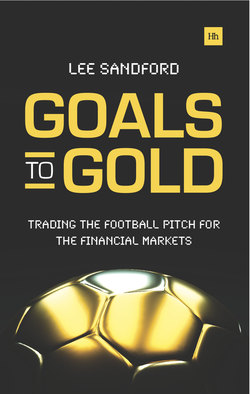Читать книгу Goals to Gold - Lee Sandford - Страница 27
На сайте Литреса книга снята с продажи.
Future planning
ОглавлениеGraduating from university changed me; it shifted my focus. I suddenly became a sponge. I wanted to learn everything I could about everything there was to know. It had finally dawned on me that being a professional footballer was not a career that could last forever. Okay, the Steven Gerrards of this world probably don’t need fall-back plans, but most of the rest of us will have a nasty bump as we come back down to earth if we don’t plan for the future.
Sadly, few footballers have this fact pressed upon them with anything like the importance it needs. At the time of writing there have been several articles in the press drawing attention to the fact that many ex-professional footballers are in severe financial difficulty, if not bankrupt. Furthermore, there are no less than 100 former footballers behind bars.
If more emphasis was put on teaching them additional skills that they could use when their football careers come to an end, or on how to invest the large sums of money they earn in their most prolific years in order to ensure a more secure financial future, it would only be a good thing. Guidance regarding alternative careers and financial planning should be as important as the careers guidance players now receive within the context of their football careers.
Back in my day, I had no idea what was the right decision for my future career and I certainly didn’t have all the facts. For instance, I automatically signed with Stoke without finding out if anyone else was interested in me. Years later, I heard that Kenny Dalglish had once tried to sign me for Liverpool but Portsmouth weren’t prepared to let me go at the time. Had I known this when my contract at PFC was finished, perhaps I would have approached him. I feel players deserve to know their career options at all times, during their time as professional footballers and after they retire.
Even personal managers and agents shouldn’t make the final decision for players. No one has a person’s best interests at heart more than they do for themselves. Whenever others enter the debate, there’s always an element of vested interest on their part. I’ve no doubt, now, that Alan Ball was thinking of how well it would reflect on him if he brought his best players up from Portsmouth.
In the end, in life, you’re always in the race alone. You have to arm yourself with all the knowledge you can get and then trust that you know best, and that includes being brutally honest with yourself and sometimes making difficult choices. To be successful in life, you need the ability to make decisions even if they are emotionally uncomfortable. You have to manage your own career, whether its football or hairdressing. Similarly, you have to manage your own investments – as I will be pointing out many times through the course of this book.
I have often questioned how well I managed my football career. (Easy to do with hindsight!) While I certainly never lacked passion for the game, I possibly lacked a certain amount of ambition.
For example, during my time at Stoke, Martin O’Neill started managing Leicester. He brought the recently relegated club back from Division One (the renamed second league) to the Premiership (the renamed top league) in 1996. When he first took over at Leicester, he was interested in signing me, but I didn’t want to leave Stoke. It could have been my chance to further my career and help put me in contention for the England squad, but I didn’t see those opportunities at the time. Although I always had my dream of being a great English football hero, of playing for my country, maybe I never saw it as anything more than a dream.
There’s a world of difference between dreams and ambition. By the very nature of the words, an ambition suggests something you believe is achievable, whereas a dream suggests something you consider out of your reach, something intangible and ephemeral. I loved Stoke, I still do. I had the best time there and it’s the first club I look out for when I check the football results, but I may have been loyal at the expense of my full potential as a professional footballer.
However, regrets are only negative if no lessons are learned. If you learn something from your decisions that gives you the ability to make better decisions in the future, then you’ve gained something positive. Instead of a regret, you can call it a learning curve. As Oscar Wilde said, experience is the name everyone gives to their mistakes.
